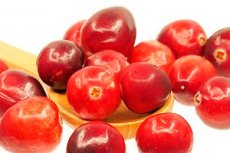
All iLive content is medically reviewed or fact checked to ensure as much factual accuracy as possible.
We have strict sourcing guidelines and only link to reputable media sites, academic research institutions and, whenever possible, medically peer reviewed studies. Note that the numbers in parentheses ([1], [2], etc.) are clickable links to these studies.
If you feel that any of our content is inaccurate, out-of-date, or otherwise questionable, please select it and press Ctrl + Enter.
Cranberries for diabetes
Medical expert of the article
Last reviewed: 04.07.2025

Another useful and quite popular berry, which, alas, is not yet cultivated in our country, is cranberry. It is native to the countries of the Northern Hemisphere, but is already developing new lands in Poland, Belarus and Russia.
Cranberries are sour berries, so it is difficult to eat a lot of them without a sweetener. In diabetes, cranberries can be consumed not only fresh, but also in the form of fruit drinks, jelly, compotes, teas, gravies, adding a sweetener to taste. For children, you can make delicious jelly or add cranberries to various dishes, mixing them with other healthy products, but at the same time controlling the calorie content and daily carbohydrate intake.
 [ 1 ]
[ 1 ]
Benefits
Bright red cranberries with their characteristic pronounced acidity and attractive appearance are one of the recognized leaders in ascorbic acid content. In addition to it, the berries contain reserves of beta-carotene, vitamins E, PP, K and group B. The berry contains all the microelements useful for diabetes, including potassium (its high content has a positive effect on the heart), iodine, necessary for the normal functioning of the thyroid gland, and manganese, which stimulates insulin synthesis and is involved in glucogenesis (deficiency of manganese in the body can cause the development of type 2 diabetes).
Cranberry is a berry that is simply made for patients with glucose metabolism disorders. The incredibly low carbohydrate content (only 6 and a half grams per 100 g of product) and caloric content (27 kcal) makes cranberry fruits an affordable and healthy delicacy for daily consumption in diabetes.
Cranberries contain a special component - ursolic acid, which in its composition and action is equal to the hormones of the adrenal glands, and helps to normalize the hormonal background disturbed by diabetes. At the same time, the use of sour fruits with healing properties is relevant for diabetes of any type.
Due to its composition, cranberries are able to reduce the level of glucose and harmful cholesterol in the blood. If the fruits are included in the daily diet, it is possible to maintain the sugar concentration at a normal level. Due to the stimulation of the production of digestive enzymes and the content of dietary fiber, cranberries help to normalize digestion and speed up metabolism.
The fruits help to normalize kidney function, strengthen blood vessels and reduce blood pressure, help prevent infectious diseases, stimulate regenerative processes in tissues, which is important in terms of preventing trophic ulcers. In terms of its antibacterial properties, this plant is equivalent to drugs, which allows reducing their dosage when treating infections and purulent wounds.
Despite the low sugar content, cranberries have a fairly high glycemic index, i.e. the sugars from this berry are absorbed fairly quickly, which can lead to the development of hyperglycemia. But this is only possible if you consume a large amount of berries at a time. Doctors allow daily intake of berries in the amount of 50-100 g, which will only improve the condition of diabetics.
Contraindications
The high content of vitamin C and pronounced sour taste become an obstacle to the use of these attractive berries with increased acidity of gastric juice. Contraindications are also any inflammatory processes in the gastrointestinal tract, occurring in an acute form.
The doctor also recommends caution for people with liver disease or low blood pressure. They are not recommended to eat the fruits regularly, although they are allowed to enjoy them occasionally.
Cranberries can also be dangerous for patients with a history of allergies, so if suspicious symptoms appear, it is better to refrain from eating the berries.

